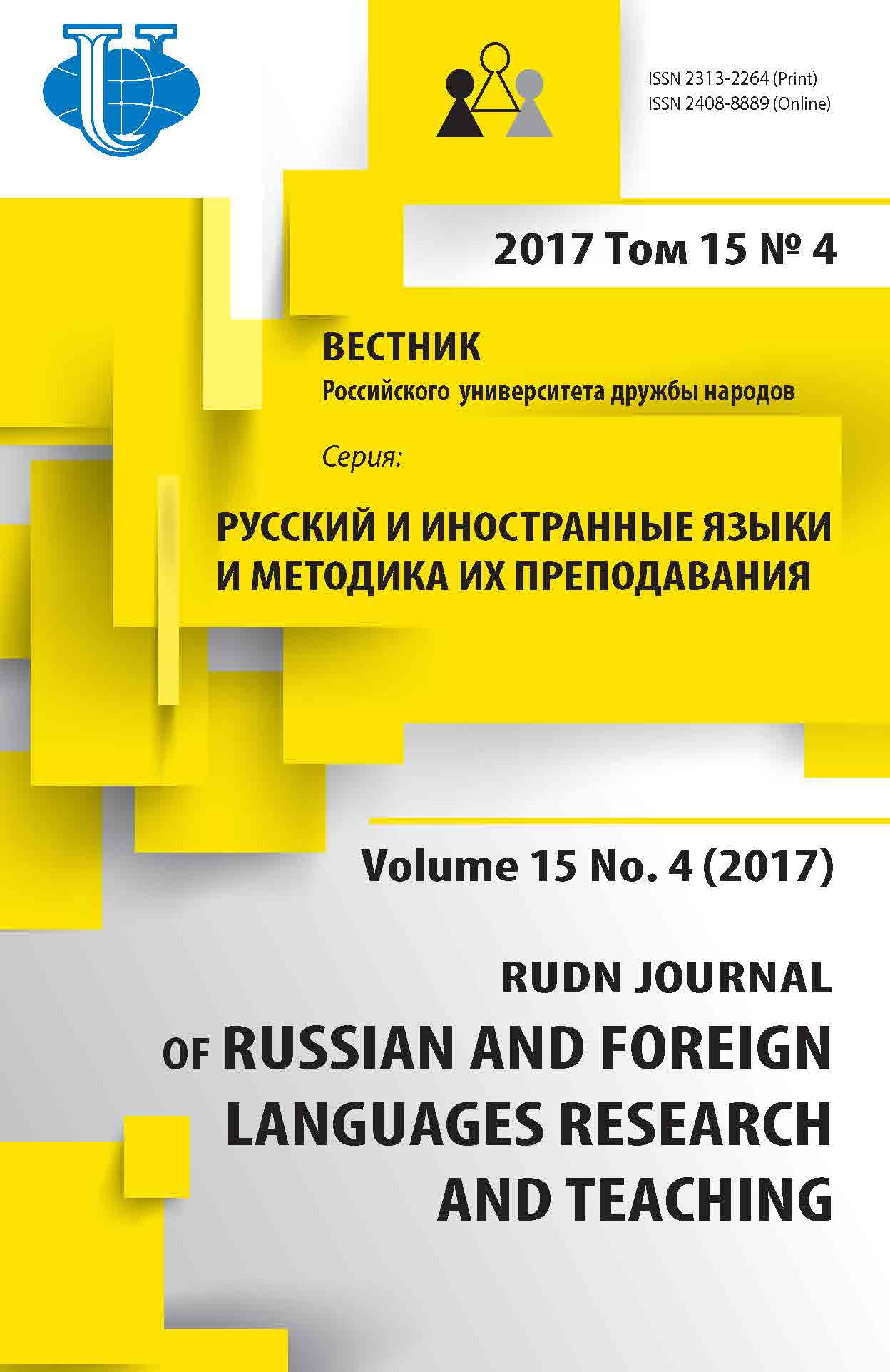CONCEPTUAL AND FRAME ORGANIZATION OF THE FAMILY OF WORDS WITH THE PEAK OF PR
- Authors: Levanova TV1
-
Affiliations:
- Moscow city University (Samara branch)
- Issue: Vol 15, No 4 (2017)
- Pages: 458-473
- Section: Articles
- URL: https://journals.rudn.ru/russian-language-studies/article/view/17449
- DOI: https://doi.org/10.22363/2313-2264-2017-15-4-458-473
- ID: 17449
Cite item
Full Text
Abstract
The author of the article suggest a conceptual and frame approach to the description of a family of words. The author study the concept of PR. The concept of PR includes 114 derived words. All vocabulary is structured according to the levels of logical classification. The upper tier of the superframe includes semes: 1) the material world; 2) the organic world; 3) the person; 4) a person in society; 5) work activity rights. On the lower tier, we select 6 subframes: 1) action, PR activity; 2) association, the structure that carries out the activities of public relations; 3) characteristics, inherent, characteristic for PR; 4) event, PR event; 5) the situation of PR; 6) relations in the field of PR.
Keywords
About the authors
T V Levanova
Moscow city University (Samara branch)
Author for correspondence.
Email: tatianalevanova@yandex.ru
Levanova T.V., postgraduate student of the Department of Philology and mass communications of the philological faculty of BU IN “Samara branch of Moscow city pedagogical University”.
Novo-Vokzalnaya str., 213, Samara, Russia, 443084References
- Boldyrev, N.N. (2000). Kognitivnaya semantika [Cognitive semantics]. Tambov: Tambov State University Publ. (In Russ).
- Vendina, T.I. (1998). Russkaya yazykovaya kartina mira skvoz prizmu slovoobrazovaniya: makrokosm [Russian language picture of the world through the prism of word formation: the macrocosm]. Moscow: Indrik Publ. (In Russ).
- Vorobjev, V.V. (1997). Lingvokulturologiya (teoriya i metody) [Linguoculturology (theory and methods)]. Moscow: PFUR Publ. (In Russ).
- Gurina, R.V., & Sokolova, E.E. (2005). Frejmovoe predstavlenie znanij [Frame representation of knowledge]. Moscow: Narodnoe obrazovanie; NII shkolnyh tekhnologij Publ.
- Zalevskaya, A.A. (2005). Psiholingvisticheskie issledovaniya. Slovo. Tekst [Psycholinguistic research. Word. Text]. Moscow: Gnozis Publ. (In Russ).
- Kazak, M.Yu., & Beketova, N.A. (2012). Sovremennoe slovoobrazovanie v massmedia: osnovnye processy v suffiksalnyh imenah sushchestvitelnyh. Nauchnye vedomosti. Seriya: Gumanitarnye nauki [Modern word formation in the mass media: the main processes in the suffixes of nouns. Scientific Bulletin. Series: Humanities. 12(131). 14. (pp. 137—145)]. (In Russ).
- Kildibekova, T.A., & Miniyarova, I.M. (2008). Kognitivnyj aspekt slovoobrazovatelnyh gnezd [Cognitive aspect of word-building]. nests // Theory of the field in modern linguistics: Proceedings of sciencetheoretical conference. IV. (pp. 26—31). Ufa: Bashkirskii un-t Publ. (In Russ).
- Klushina, N.I. (2008). Stilistika publicisticheskogo teksta [Stylistics of the journalistic text]. Moscow: Media-Mir: MGU journalists’ faculty Publ. (In Russ).
- Morkovkina, V.V. (2004). Kompleksnyj uchebnyj slovar: Leksicheskaya osnova russkogo yazyka [Comprehensive academic dictionary: Lexical basis of the Russian language]. Moscow: Ast: Astrel Publ. (In Russ).
- Kosyreva, M.S. (2008). Derivacionno-frejmovaya paradigma kak edinica kognitivnogo modelirovaniya sistemnyh otnoshenij mezhdu odnokorennymi slovami: na materiale internacionalnoj leksiki [Derivation-frame paradigm as the unit of cognitive modeling system of relations between cognate words: on the basis of international language]. (Candidate dissertation, Kemerovo). (In Russ).
- Kubryakova, E.S. (1996). Kratkij slovar kognitivnyh terminov [Brief dictionary of cognitive terms]. Moscow: Filol. fak. MGU Publ. (In Russ).
- Kryuchkova, O.S. (2003). Kognitivno-diskursivnaya paradigma i slovoobrazovanie [Cognitive-discursive paradigm and word-formation]. Problems of verbalization of concepts in the semantics of language and text: Proceedings of International Simpozium. 1. (pp. 201—207). Volgograd. (In Russ).
- Manerko, L.A. (2003). Istoki i osnovaniya kognitivno-kommunikativnogo terminovedeniya. Leksikologiya. Terminovedenie. Stilistika (pp. 120—126). Moscow; Ryazan. (In Russ).
- Miniyarova, I.M. (2010). Kognitivnyj analiz slovoobrazovatelnyh gnezd [Cognitive analysis of word-building nests]. Bulletin of the Bashkir University. 15. 3-1. (In Russ).
- Morkovkin, V.V. (1970). Ideograficheskie slovari [Ideographic dictionaries]. Moscow. (In Russ).
- Osadchij, M.A. (2009). Gnezdo odnokorennyh slov kak dinamicheskij frejm [Nest of one-root words as a dynamic frame]. Actual problems of modern word-formation: Proceedings of International science conference (pp. 184—190). (In Russ).
- Pimenova, M.V., & Kondratjeva, O.N. (2009). Vvedenie v konceptualnye issledovaniya [Introduction to conceptual research]. Kemerovo: KemGU Publ. (In Rus).
- Prohorov, Yu.E. (2011). V poiskah koncepta [In search of a concept]. Moscow: Flinta; Science Publ. (In Russ).
- Zemskaya, E.A. (1996). Russkij yazyk konca XX stoletiya (1985—1995) [Russian language of the late twentieth century (1985—1995)]. Moscow: Yazyki rus. kultury Publ. (In Russ).
- Savkatova, A.M. (2010). Slovoobrazovatelnoe gnezdo kak reprezentant koncepta (na materiale slovoobrazovatelnogo gnezda s vershinoj «zhenshchina»). Vysshee obrazovanie segodnya [Derivational nest as a representant of a concept (based on the word-formative nest with the top “female”). Higher education today. 3. (pp. 90—92)]. (In Russ).
- Tihonov, A.N. (2014). Novyj slovoobrazovatelnyj slovar russkogo yazyka dlya vsekh, kto hochet byt gramotnym: okolo 40000 slov, primerno 10000 slovoobrazovatelnyh gnezd [New word-formative dictionary of the Russian language for everyone who wants to be literate: about 40,000 words, roughly 10,000 word-formation nests]. Moscow: Lingua: AST Publ. (In Russ).
- Shaklein, V.M. (2010). Lingvokulturnaya situaciya v sovremennoj Rossii [Linguocultural situation in modern Russia]. Moscow: Flinta; Science Publ. (In Russ).
- Shaklein, V.M. (2012). Lingvokulturologiya: tradicii i innovacii [Linguoculture: traditions and innovations]. Moscow: Flinta Publ. (In Russ).
- Yankova, N.A. (2009). Koncept sokrovennoe v sovremennom anglijskom yazyke: kognitivno-propozicionalnaya struktura [A concept unseen in modern English: a cognitive-propositional structure]. Bulletin of the Buryat state University. 11. (pp.169—176). (In Russ).
Supplementary files














